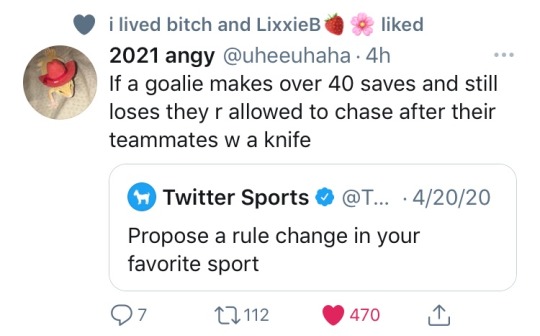Welcome to my love affair with Hawkeye, VGK and Jeremy Renner. You're welcome. If you are here, I appreciate you. You're important to me and to the world. Thank you for being here and sharing your story and your experiences with us. 18+ owner.
Don't wanna be here? Send us removal request.
Text
@caitriona-3 @b1g-biscuit
A love letter to the co-conspiritors
They have many names—beta reader, friend, Oh Fuck You—but you know who they are: they’re the person who is as rabid as you about a ship or a character, the one you DM with your most twisted headcanons, the one who agrees that YES, he SHOULD be tied to a chair and slapped in the face—that she SHOULD be allowed a little tragic backstory, as a treat—that they SHOULD be roommates who are secretly pining for one another…the one who hashes out with you, at past midnight, how soon is reasonable for people with superpowers to have sex after one of them has been shot in the leg.
They’re the person who reads your fic before you send it to anyone else, and raves with you about that plot point that you COULDN’T WAIT for them to reach, or points out where you’ve forgotten that they were at the bar, not the library, so you need to remove the reference to book stacks, or pokes you to finish the goddamn next chapter because they want to read it, okay?
Fandom would not exist without them. They enable and encourage. Some of them are also fic writers, and you get to enable them right back. Some of them create fan art, or meta, or text post edits, or run prompt fests, or edit wikis…some of them are simply just as in love with the same thing that you are and want to feed the squee.
If you’re lucky enough to have someone like this in your life, you’ll know how much impact they have. It’s different to getting comments and kudos (wonderful though those are!), because they come in before the fic is finished, sometimes even before it’s started, and say ‘yes, do it!’. The fact that I’ve written so much for Community and The Umbrella Academy is completely down to @bethanyactually and @wheresmytowel respectively, and I count myself incredibly lucky to have them both in my life (and not just for all this, but also because they’re both incredibly lovely and smart and fun).
It was Fanfic Writer Appreciation Day yesterday (Aug 21st), and it made me think that we should also give a shoutout to the co-conspiritors, because without them, an awful lot more fic writers would be stress-scrolling through tumblr instead of working on their WIP, and there’d be so much less fic in the world.
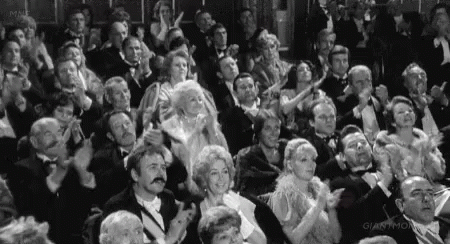
2K notes
·
View notes
Text
I needed this reminder today.
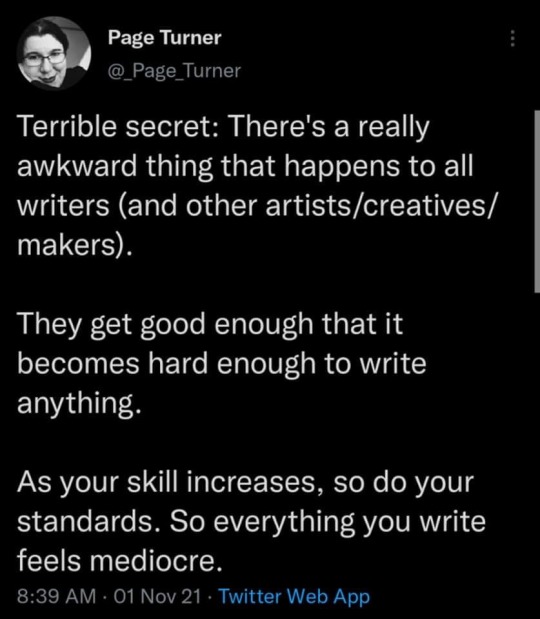

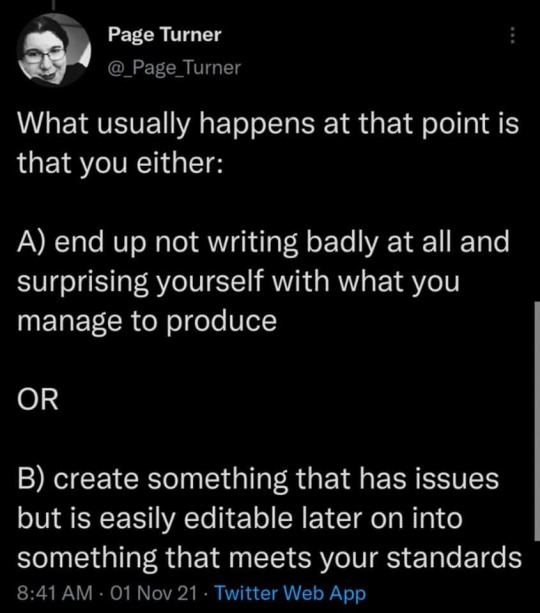

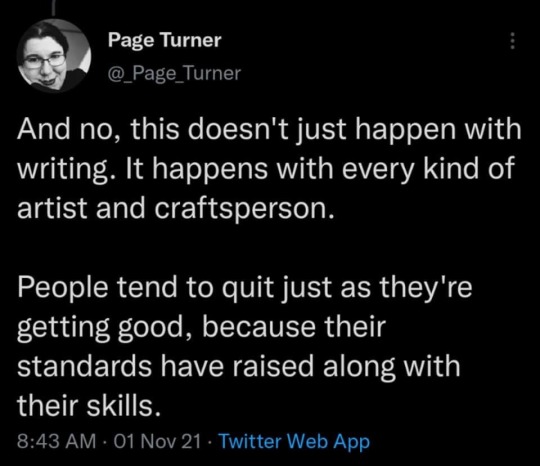

This hit home, and I think it will resonate hard with all my creative friends, here. You are amazing and brilliant and I BEG YOU to keep creating!! ❤️❤️❤️
54K notes
·
View notes
Text
Snowflakes-Day 2
For the Fandom Snowflake Challenge
Day 2 In your own space, share a favorite memory about fandom: the first time you got into fandom, the last time a fanwork touched your heart, crazy times with fellow fans (whether on-line or off-line), a lovely comment you’ve received or have left for someone.
So I’ve met a number of friends through fandom, through fan fiction, specifically. I have adopted kin I’ve never met physically, because of fandoms. @quadradaz and @galahadsgurl and @lotrfansez and @killakathy88 and @naruturd330, Beth_Mac and ValkyriePhoenix on Ao3, it’s all because of fandom that I know these people at all, yet they’ve had a profound effect on me.
So I guess I don’t have A favorite memory, I have a LOT of favorite memories. I’ve been so blessed. I remember getting to work on Secret Bit of Right From Wrong waaay back when, worrying that my scribblings wouldn’t fulfill the request on the AFF forums, then being pleasantly surprised when it was loved. I remember writing All Those Who Wander and feeling drunk on the comments as I raced to a finish. I remember shyly putting forth fan-works of a fan-work and the three-day smile I had when Least of My Kind was posted. I remember beta-ing stories and cheering on friends. I remember getting goaded into a body-swap time-travel fic and the MASSIVE outpouring of support that broke the kudo counter in the first 24 hours. I remember being given a fic for Mothers Day and the intense pride I felt in my fan-child. I remember crack-fic-o-clock and laughing so hard I couldn’t type.
I remember.
And isn’t that what this is all about?
14 notes
·
View notes
Photo
@caitriona-3 I am a little late.

@galahadsgurl - Happy Best Friends Day!!
4 notes
·
View notes
Text






First Look at The Black Dagger Brotherhood by J.R. Ward
105 notes
·
View notes
Text






First Look at The Black Dagger Brotherhood by J.R. Ward
105 notes
·
View notes
Text
Home

"The feeling of being curled up in your arms, with our fingers intertwined and the soft feel of your breath on my neck can never be put into words. I can, however, tell you that it is where I belong and it is in those arms that I feel at home." - anon
Artwork by ChristineChangIllustration
53 notes
·
View notes
Text
Soul's Embrace

"Maybe it's not about the length of time you've known someone; maybe it's about instant recognition on an unconscious level. Our souls know each other. - S. E. Hall
77 notes
·
View notes
Text
Naval aviation fun facts for today: naval aviators are *not* required to give up their wings (or leave flight status) once they reach a certain rank! It is absolutely true that for the vast majority of aviators, once they reach a certain rank the jobs available to them are not jobs that require them to fly, but admirals can still fly (provided they pass a flight physical and are on flight status), although they wouldn't do so frequently bc they would be busy doing other things. The amount you fly as an aviator has much more to do with what job you're doing than what rank you are! (An LT doing a tour at the Pentagon probably isn't flying at all, while a CDR with the Blue Angels is, of course, flying nearly every day!)
Also, giving up your wings is not the same thing as having a non-flying job! Giving up your wings means you're no longer designated as a naval aviator/naval flight officer, and it's a very long process that you would only complete if you have the desire to drop out of aviation altogether, because it involves needing to apply to, be accepted by, and train in another warfare community (e.g. surface warfare, intel, subs, etc). Otherwise, you can absolutely be a designated naval aviator/naval flight officer occupying a non-flying billet (provided you meet the qualifications)! Almost all naval aviators/naval flight officers have portions of their careers where they are barely flying or not flying at all -- it's just part of how the career progression goes!
142 notes
·
View notes
Text
American Girls in my style!
Just a fun little fan art series purely for the nostalgia! Do you have a favorite?

Molly and Kit

Addy and Samantha

Kirsten and Kaya
Still working on a few more!
#I had a Molly Doll growing up#Kristen and Addy and Samantha were my favorites#Kit and Kaya came after my childhood#but I LOVE the American Girl Collections
3K notes
·
View notes
Text
Anthony Ramos and Dominique Thorne for EMMY Magazine!
Photographed by: Miranda Penn Turin (Styled by Laura Sophie Cox & Jason Rembert)








Ironheart comes out June 24th on Disney+, Anthony and Dominique will portray Parker Robbins (The Hood) and Riri Williams respectively.
56 notes
·
View notes
Text
"i don't comment on ao3 because i don't wanna be annoying or weird" skill issue + you greatly underestimate the power dynamic here, writing multi paragraph comments is like feeding a bunch of deeply insane and possibly starved ducks at the park and watch them go completely mad over having received a piece of bread
#fanfiction#support your local fanfic writers#leave them a multi paragraph comment and watch them lose their minds
51K notes
·
View notes
Text

My thoughts and prayers go out to the family and friends of Yaron Lischinsky and Sarah Milgrim. Hatred of Israel and of the Jewish people have no place in this world.
"If I am to understand…that you are enquiring whether I am of Jewish origin, I can only reply that I regret that I appear to have no ancestors of that gifted people." J.R.R. Tolkien
6 notes
·
View notes
Text
pray for those who hate you
pray for those who mock you
pray for those who curse you
pray for those who belittle you
pray for those who laugh at you
pray for those who persecute you
pray for those who can't stand you
pray for those who would never pray for you.
2K notes
·
View notes


